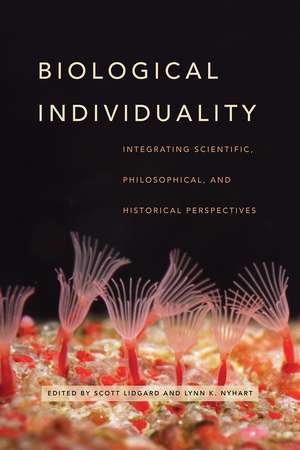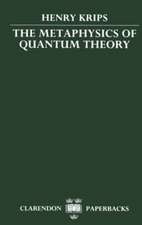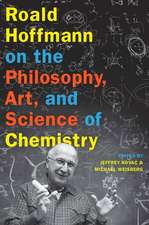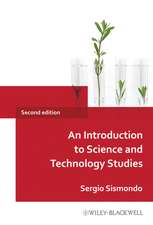Biological Individuality: Integrating Scientific, Philosophical, and Historical Perspectives
Editat de Scott Lidgard, Lynn K. Nyharten Limba Engleză Paperback – 24 mai 2017
Individuals are things that everybody knows—or thinks they do. Yet even scholars who practice or analyze the biological sciences often cannot agree on what an individual is and why. One reason for this disagreement is that the many important biological individuality concepts serve very different purposes—defining, classifying, or explaining living structure, function, interaction, persistence, or evolution. Indeed, as the contributors to Biological Individuality reveal, nature is too messy for simple definitions of this concept, organisms too quirky in the diverse ways they reproduce, function, and interact, and human ideas about individuality too fraught with philosophical and historical meaning.
Bringing together biologists, historians, and philosophers, this book provides a multifaceted exploration of biological individuality that identifies leading and less familiar perceptions of individuality both past and present, what they are good for, and in what contexts. Biological practice and theory recognize individuals at myriad levels of organization, from genes to organisms to symbiotic systems. We depend on these notions of individuality to address theoretical questions about multilevel natural selection and Darwinian fitness; to illuminate empirical questions about development, function, and ecology; to ground philosophical questions about the nature of organisms and causation; and to probe historical and cultural circumstances that resonate with parallel questions about the nature of society. Charting an interdisciplinary research agenda that broadens the frameworks in which biological individuality is discussed, this book makes clear that in the realm of the individual, there is not and should not be a direct path from biological paradigms based on model organisms through to philosophical generalization and historical reification.
Bringing together biologists, historians, and philosophers, this book provides a multifaceted exploration of biological individuality that identifies leading and less familiar perceptions of individuality both past and present, what they are good for, and in what contexts. Biological practice and theory recognize individuals at myriad levels of organization, from genes to organisms to symbiotic systems. We depend on these notions of individuality to address theoretical questions about multilevel natural selection and Darwinian fitness; to illuminate empirical questions about development, function, and ecology; to ground philosophical questions about the nature of organisms and causation; and to probe historical and cultural circumstances that resonate with parallel questions about the nature of society. Charting an interdisciplinary research agenda that broadens the frameworks in which biological individuality is discussed, this book makes clear that in the realm of the individual, there is not and should not be a direct path from biological paradigms based on model organisms through to philosophical generalization and historical reification.
Preț: 224.46 lei
Nou
Puncte Express: 337
Preț estimativ în valută:
42.95€ • 45.93$ • 35.81£
42.95€ • 45.93$ • 35.81£
Carte tipărită la comandă
Livrare economică 18 aprilie-02 mai
Preluare comenzi: 021 569.72.76
Specificații
ISBN-13: 9780226446455
ISBN-10: 022644645X
Pagini: 400
Ilustrații: 14 halftones, 2 tables
Dimensiuni: 152 x 229 x 23 mm
Greutate: 0.5 kg
Ediția:1
Editura: University of Chicago Press
Colecția University of Chicago Press
ISBN-10: 022644645X
Pagini: 400
Ilustrații: 14 halftones, 2 tables
Dimensiuni: 152 x 229 x 23 mm
Greutate: 0.5 kg
Ediția:1
Editura: University of Chicago Press
Colecția University of Chicago Press
Notă biografică
Scott Lidgard is the MacArthur Associate Curator of Fossil Invertebrates in the Integrative Research Center at the Field Museum, Chicago, and a lecturer in the Committee on Evolutionary Biology at the University of Chicago. He is coeditor of Evolutionary Patterns: Growth, Form, and Tempo in the Fossil Record, also published by the University of Chicago Press. He lives in Skokie, IL. Lynn K. Nyhart is the Vilas-Bablitch-Kelch Distinguished Achievement Professor of the History of Science at the University of Wisconsin‒Madison. She is the author, most recently, of Modern Nature: The Rise of the Biological Perspective in Germany, also published by the University of Chicago Press. She lives in Madison, WI.
Cuprins
Introduction: Working Together on Individuality
Lynn K. Nyhart and Scott Lidgard
l The Work of Biological Individuality: Concepts and Contexts
Scott Lidgard and Lynn K. Nyhart
2 Cells, Colonies, and Clones: Individuality in the Volvocine Algae
Matthew D. Herron
3 Individuality and the Control of Life Cycles
Beckett Sterner
4 Discovering the Ties That Bind: Cell-Cell Communication and the Development of Cell Sociology
Andrew S. Reynolds
5 Alternation of Generations and Individuality, 1851
Lynn K. Nyhart and Scott Lidgard
6 Spencer’s Evolutionary Entanglement: From Liminal Individuals to Implicit Collectivities
Snait Gissis
7 Biological Individuality and Enkapsis: From Martin Heidenhain’s Synthesiology to the Völkisch National Community
Olivier Rieppel
8 Parasitology, Zoology, and Society in France, ca. 1880–1920
Michael A. Osborne
9 Metabolism, Autonomy, and Individuality
Hannah Landecker
10 Bodily Parts in the Structure-Function Dialectic
Ingo Brigandt
Commentaries: Historical, Biological, and Philosophical Perspectives
11 Distrust That Particular Intuition: Resilient Essentialisms and Empirical Challenges in the History of Biological Individuality
James Elwick
12 Biological Individuality: A Relational Reading
Scott F. Gilbert
13 Philosophical Dimensions of Individuality
Alan C. Love and Ingo Brigandt
Acknowledgments
List of Contributors
Index
Lynn K. Nyhart and Scott Lidgard
l The Work of Biological Individuality: Concepts and Contexts
Scott Lidgard and Lynn K. Nyhart
2 Cells, Colonies, and Clones: Individuality in the Volvocine Algae
Matthew D. Herron
3 Individuality and the Control of Life Cycles
Beckett Sterner
4 Discovering the Ties That Bind: Cell-Cell Communication and the Development of Cell Sociology
Andrew S. Reynolds
5 Alternation of Generations and Individuality, 1851
Lynn K. Nyhart and Scott Lidgard
6 Spencer’s Evolutionary Entanglement: From Liminal Individuals to Implicit Collectivities
Snait Gissis
7 Biological Individuality and Enkapsis: From Martin Heidenhain’s Synthesiology to the Völkisch National Community
Olivier Rieppel
8 Parasitology, Zoology, and Society in France, ca. 1880–1920
Michael A. Osborne
9 Metabolism, Autonomy, and Individuality
Hannah Landecker
10 Bodily Parts in the Structure-Function Dialectic
Ingo Brigandt
Commentaries: Historical, Biological, and Philosophical Perspectives
11 Distrust That Particular Intuition: Resilient Essentialisms and Empirical Challenges in the History of Biological Individuality
James Elwick
12 Biological Individuality: A Relational Reading
Scott F. Gilbert
13 Philosophical Dimensions of Individuality
Alan C. Love and Ingo Brigandt
Acknowledgments
List of Contributors
Index
Recenzii
"Lidgard and Nyhart have compiled a superb collection of essays concerning recent work on the concept and nature of biological individuals. . . . The overarching question ‘What is a biological individual?’ is demonstrated to have an intricate history, changing and evolving as biologists learned more about organismic structures and functions, life cycles, cellular systems, and ecological interactions. Notions of what counts as an individual are shown to have carried over into social and political identities and practices. In addition, philosophical, conceptual underpinnings and commitments are shown to interplay with these changing biological understandings. . . . The volume is marvelous! While not for the casual reader, it is exemplary of the best current work in biological philosophy. . . . Highly recommended."
“I found this collection a very enjoyable read and recommend it as a starting point to anyone interested in the notion of biological individuality broadly construed and interested in understanding what unifies and separates the different meanings of this term across time and disciplines.”
“Individuality is one of the hottest topics in the philosophy of biology today. The recent, technologically driven explosion of knowledge about the microbial world has led both biologists and philosophers to reconsider the traditional idea that organisms are genetically uniform populations of cells with a clear physical boundary—bodies. Very up-to-date, containing a number of substantial original contributions, and with a good balance of historians, philosophers, and eminent scientists, Biological Individuality is well positioned to represent the most exciting strands of the current debate.”
“A tour de force inquiry of individuality that proposes a fruitful perspective that potentially resolves many of its disparate definitions. Biological Individuality reflects the strengths of cross-disciplinary research on fundamental biological concepts.”
"...how has the discussion and the concept of biological individuality evolved over the past 25 years or so? Scott Lidgard and Lynn Nyhart’s volume aims to answer that question and succeeds admirably...This book pushes one hard to reexamine foundational ideas about what biology studies as its basic subject matter."













